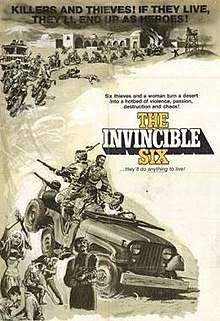The Invincible Six
The Invincible Six is a 1970 American-Iranian adventure film directed by Jean Negulesco and starring Stuart Whitman, Elke Sommer, Curd Jürgens, and Ian Ogilvy.[1] Six international criminals attempt to steal the crown jewels of Iran,[2] but in the tradition of 1954 film Seven Samurai and the 1960 film The Magnificent Seven, end up defending a village from bandits. This was the final film of Negulesco's long career.
| The Invincible Six | |
|---|---|
 | |
| Directed by | Jean Negulesco |
| Produced by | Mostafa Akavan Morteza Akhavan |
| Written by | Michael Barrett (novel) Guy Elmes Chester Erskine |
| Starring | Stuart Whitman Elke Sommer Curd Jürgens James Mitchum |
| Music by | Manos Hatzidakis |
Release date | 10 June 1970 |
Running time | 103 minutes |
| Country | Iran United States |
| Language | English |
Plot
An adventurous American whom everybody calls Tex, and his partners, the mechanically savvy Mike and an Englishman named Ronald, are foiled in their bid to steal Tehran's precious jewels. In the desert, they join up with three other criminals, an Iranian, an Italian, and a German, to plot another heist.
They have the good fortune of meeting Zari, the beautiful mistress of the infamous bandit Malik, who is after a valuable amulet. So is the man who wants to claim Malik's place in the eyes of all, Nazar, but all does not go well. Ronald is captured and tortured, Nazar is shot, and Zari is soon forced to decide if she wishes to continue on to wherever fate takes Tex next.[3]
Cast
- Stuart Whitman as Tex
- Elke Sommer as Zari
- Curd Jürgens as Baron Karl von Bitterhofen
- James Mitchum as Nazar
- Ian Ogilvy as Ronald
- Behrouz Vossoughi as Jahan
- Lon Satton as Mike
- Isarco Ravaioli as Giorgio
- Pouri Banayi as Jahan's wife
See also
References
- https://www.imdb.com/title/tt0063137/
- BFI.org
- Michael Schell, "Film review: The Invincible Six". Schellsburg, May 2015. Retrieved 10 November 2018